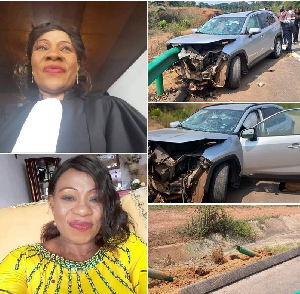Six weeks ago, police shot a homeless man in Los Angeles. He was battling mental illness; he was combative. A bystander's video captured it: the struggle with four officers, the cracking shots and onlookers' shock, and the homeless man became still.
The next day, a cardboard sign appeared at the site where he died (and where he'd lived, in a tent): RIP Cameroon. And then he faded, in less than a week, from the news. The names and stories of other unarmed black men killed by police stay on our minds and in the media, but even with the grisly footage of Cameroon shot dead in real time, he disappeared. Why? Because he was homeless? Mentally ill? Immigrant? African? Did he matter less?
Cameroon is a place of deep orange roads, bright green trees, black sand beaches. Music all the time on the streets, played through tinny radios in tiny shops. Goats and chickens and bush taxis and palm wine and kola and people waving with two hands for special occasions. It could not be more different than L.A. It could not be more different.
How did Cameroon journey so far? How did he come to die like this, so dehumanizing, so public? What part of his death belongs to him and what to us?
I once attended a baby shower in Cameroon where the women, wearing matching skirts and ankle bells, danced in a circle and took turns singing. One sang (in French), If I die...don't bury me in the city...bury me in the village...oh, if I die. The verse was repeated again and again and each time the singer added a different woman's name, as if making sure that everyone present, all of her sisters and cousins and friends, knew where to bury her when the time came.
And now here was a Cameroonian, dead on a street corner in a foreign city. So far from any village. Who would bury him?
In that same Cameroonian village, there lived a Fou. In French, this translates directly to crazy person. She was mentally ill. I saw her a lot because I could never finish the food heaped on my plate by my host mothers, and she was always given the leftovers. I don't know who her mother was because she belonged to everyone. It was everyone's job to feed her, clothe her, house her. Would Cameroon have lived this way, had he stayed? Would he have been different?
It's impossible to say. Maybe he didn't live in a village. Maybe he left for a reason. Maybe his illness would have ruled him wherever he went. We can't be too sentimental: mentally ill Africans are often underserved and Cameroonian was a criminal. He stole a French man's identity, was convicted of armed bank robbery in 2000 and served 13 years in prison. In the moments before he was shot, he was swinging at police.
When police kill unarmed black men, we usually hear phrases like father of four, beloved by his community, active in church. As if without these phrases, the death would be justified. As if human rights activate only for those who are good enough.
This sentiment is old; it's the reason Rosa Parks was chosen over Claudette Colvin, a pregnant teenager, as the symbol of the Montgomery bus boycott, though both were abused on buses and both deserved humane treatment. It's the reason Cameroon disappeared from the news at the exact time that others were lifted up.
When we say blacklivesmatter, we need to mean all black lives, without qualification or restriction. Otherwise, we risk building an elitist movement with a shaky claim to social justice. When all black lives matter, we include homeless, mentally ill, African, immigrant, and yes, even criminal lives. Even Cameroon's life, as broken as it had become.
Try blocking out everything but him, Cameroon, in his final, brutal moment of life, a prisoner of illness, homelessness, and poverty, every limb pressed to the ground by a separate man. I can only hope that death came in a flash of orange and green. That he escaped the hard, gray grit of that sidewalk, to feel the mud again. That somebody buried him in the village.
Opinions of Thursday, 16 April 2015
Auteur: Al.com















